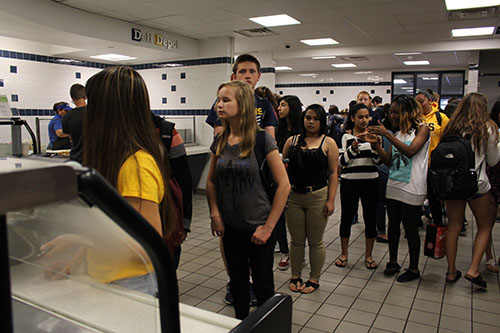Quest adapts new balance policy, bans purchasing lunch with negative funds

hungry high schoolers: Queued up in the cafeteria, students wait to be served at food court stations. Quest has recently changed their policies regarding negative balances.
September 30, 2016
In response to major debt last year, Quest Food Management Services is now enforcing a policy at Glenbrook South which does not allow students to hold a negative balance on their Quest account.
The policy states that a student cannot purchase food from the cafeteria without the proper funds in their account. Nevertheless, Wayne King, the vice president of operations for Quest, wants to make sure this policy does not take away a student’s meal.
“The important approach for [Quest] was to make sure, number one, from an organizational standpoint, that no one was turned away,” King said.
If a student comes to buy lunch but has a negative balance, any prepackaged food (potato chips, candy bar) is collected and the student is provided with a “value meal” as a substitute lunch for that day. However, if a student has already picked up a handmade item, they are allowed to buy it so that it will not be thrown away. In both cases the student is expected to replenish their account for the next day.
In attempt to solve this problem, Quest Services communicated with GBS cafeteria staff through a training process in which the staff walked through different scenarios that may play out throughout the school year, specifically dealing with how staff should alert students when their accounts run low.
“What should happen for you as students if you come through the cafeteria, [and] reach a balance of 20 dollars or less, [is that] our staff should be communicating to you,” King said.
This differs from the protocol last year, in which students were allowed to go into a large negative balance throughout the entire school year to purchase food. King explained that these negative balances were not monitored very closely, therefore resulting in the implementation of the policy this year.
“There were significant dollars outstanding,” King said. “At a certain point, [Quest] just can’t collect anymore.”
According to Principal Lauren Fagel, concerns regarding the negative lunch balance policy were brought up among Board members and Quest representatives over the summer. Fagel also discussed the motives behind this policy and the major debt in some GBS students’ food accounts.
“It’s not fun to chase people down for money,” she said. “[This policy] prevents Quest from having unpaid balances.”
Fagel added that this policy is a motivation for students to be more responsible about their lunch account balances. She says that before the rule was administered, students were able to go accumulate large amounts of debt going into the negatives.
“Before the enforcement of this policy, it was possible for a student to have theoretically an unlimited amount of debt,” Fagel said.
Joy Cooper, coordinator of the Titan Learning Center and Peer Group coordinator, agreed with Fagel’s sentiment pertaining to the lunch policy being for the overall bettering of students. She also believes that students should be responsible for their own lunch accounts instead of depending on Quest and going into the negative balances.
“I think it is fair that kids should be expected to pay in a timely manner,” Cooper said. “Stores don’t typically extend credit of this [type of] nature, and I imagine Quest lost a lot of money in the past.”
Aside from the major debt, feedback from parents became a prominent reason for the enforcement of this policy. King explained that many South parents were unaware of the debt that their child was accumulating, which was another cause for the additional enforcement of Quest’s new lunch policy.
“I can speak on behalf of both Quest and as a parent,” he said. “If someone called me and said, ‘You owe Quest 50 dollars because your son or daughter ran over,’ my question would be, ‘Who’s extending that credit to my child?’ And that’s a lot of the feedback we got from parents.”
In a nonscientific Oracle-conducted survey, it was revealed that out of 263 students, 17.8% missed at least one meal due to this policy. GBS junior Alex Economou says that he understands the reasoning behind the policy, but believes that a way to ease student complaints would be to allow students to carry a negative balance up to a set limit.
“As high schoolers we are stressed and don’t have time to worry about a lunch balance,” Economou said.
According to King, this “no negative balance” policy is widely understood to be something newly implemented by Quest; however, it is actually just an enforcement of a policy that has been in place for years. He acknowledged that there could be some negative feedback at first because it seems like a sudden change, but so far King says that the complaints have been minimal.
“Overall, because we were well prepared as far as the communication [and] the training component of it, I think it has gone over fairly well,” King said.
*The Journalistic Writing class contributed to this report.


